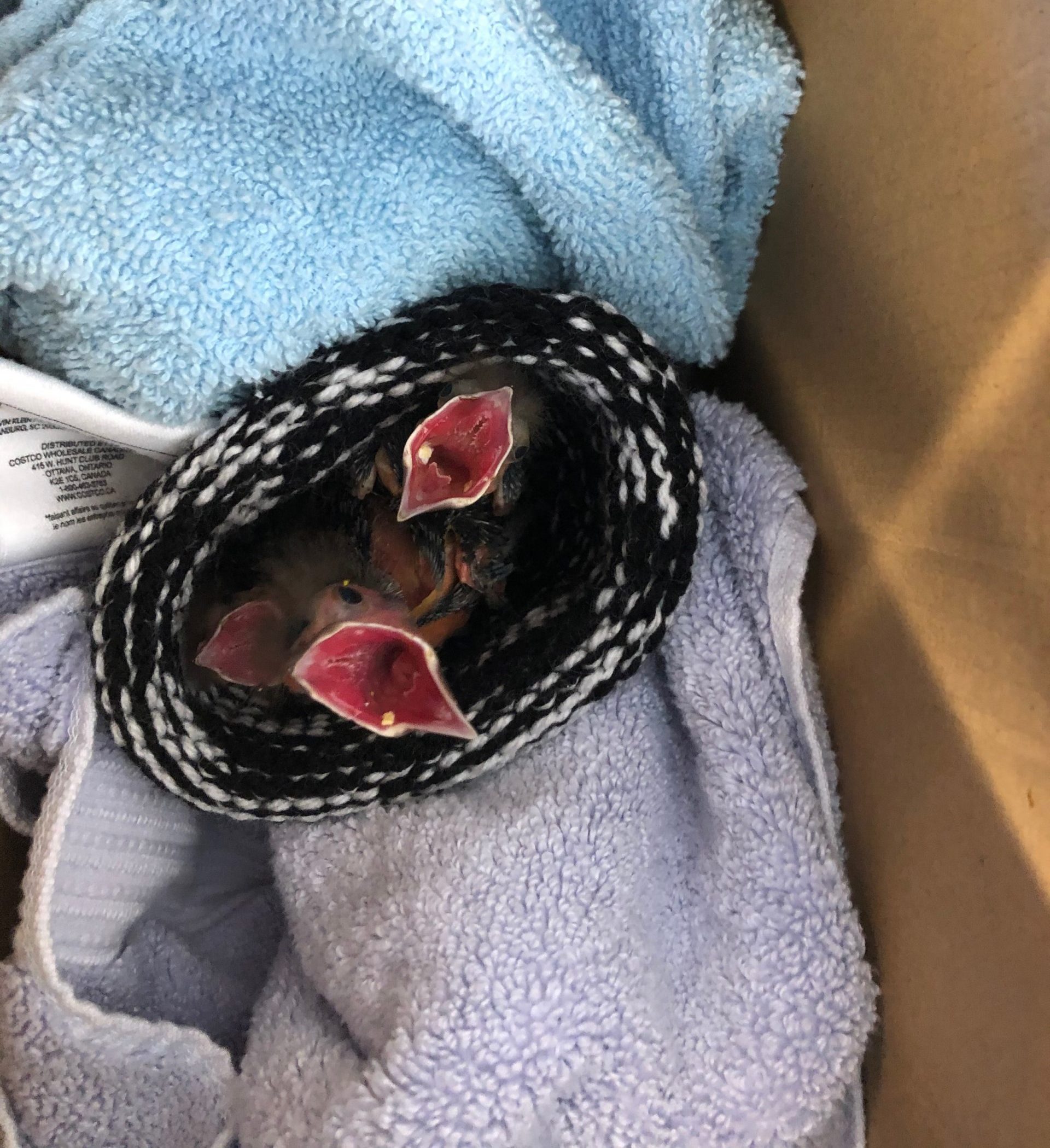Living with Wildlife
In Southern Ontario, we are lucky to share our space with a diverse range of animals. These animals are incredibly important to the health and wellness of our environment, and many have learned to live with us in cities and towns. With limited wild spaces left, we must learn to coexist with our wild neighbors and prevent conflict through education and preemptive measures. If you ever have any concerns regarding injured wildlife, or feel a wild animal is in distress don’t hesitate to call the Guelph Humane Society.
If you see a wild animal that you feel may be in an emergency situation, either sick, injured, orphaned or in distress, and you are within the City of Guelph, Township of Centre Wellington or Township of Guelph/Eramosa, please CALL US at 519-824-3091. DO NOT approach the animal or try to handle it. Our staff will be able to assess the situation and walk you through the next steps.
If you are not located within our service jurisdiction, please contact your local Humane Society, SPCA or Animal Control Provider. Regrettably due to limited resources, Guelph Humane Society is not able to provide wildlife assistance outside our jurisdiction.
If your situation NOT an emergency, but you would like advice on how to resolve a wildlife conflict, please feel free to email wildlife@guelphhumane.ca or scroll to the Conflict with Wildlife Section at the bottom of this page.
We’re here to help!
Email: wildlife@guelphhumane.ca
Call: 519-824-3091
Alternatively, if you would prefer to consult with a Wildlife Rehabilitator authorized by the Ministry of Natural Resources directly, we recommend consulting with the Ontario Government webpage which can be found HERE.
After we assist wildlife and bring them into our care, check out what happens next by clicking HERE.
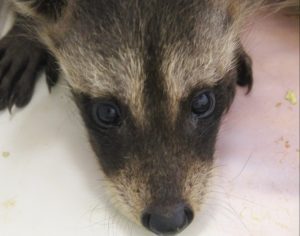
Raccoons
Information
Raccoons are incredibly intelligent creatures who have learned to adapt to the urban landscape.
Did you know it’s normal to spot a raccoon out during the day?
A mother raccoon may have up to seven babies to care and raise on her own, that’s a lot of mouths to feed! Being seen out and about during the day doesn’t mean they require help. If you suspect a raccoon requires assistance, please contact us at 519-824-3091.
Canadian Wildlife Federation:
(https://cwf-fcf.org/en/resources/encyclopedias/fauna/mammals/raccoon.html)
Identifying Sick or Injured Raccoons
Some indicators that a raccoon might be sick or injured include:
- Visible injuries such as limping or bleeding
- Discharge around the eyes and/or nose
- No fear of human/domestic pets (when being approached)
- Sleeping in high traffic areas or in the open during the day on ground level
If you encounter a raccoon exhibiting any of these behaviors, please call the Guelph Humane Society at 519-824-3091
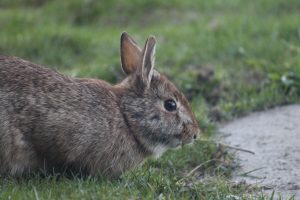
Eastern Cottontail Rabbits
Information
Ontario is home to five species of rabbits and hares, but if you’re in Southern Ontario you’re most likely to encounter the Eastern Cottontail. Eastern Cottontails can have 3-4 litters of babies, called kits, a year! Their nests are shallow indentations in the ground, covered in grasses and tufts of the mother’s fur. They are often out in the open and are common in lawns and gardens.
For more information about living with Eastern Cottontail Rabbits please visit:
What to do if you found a rabbit nest
Rabbits are very sensitive to human smell, it is highly suggested to not move baby rabbits
If you are worried the babies may be abandoned:
- Using gloves, you can place two strings in an “X” shape over the nest
- Check back in the morning to see if it has been disturbed
- Mothers will generally only visit the nest twice a day to feed her young, usually at dawn and dusk
- If the string has not been moved, please call the Guelph Humane Society at 519-824-3091
- Any young that still have their eyes closed found outside of the nest require help
- If your cat or dog has found the nest and disturbed it the babies may require help
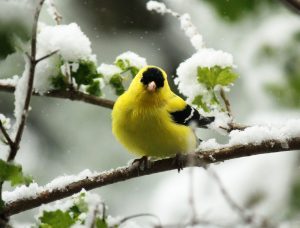
Birds
Information
Did you know that there have been over 211 species of birds observed in University of Guelph’s Arboretum? Most of these documented birds are songbirds, which are smaller perching birds that you can often find at a birdfeeder such as sparrows, doves, warblers and many more!
Guelph Humane Society is pleased to be involved in the Cats & Birds Campaign! Please visit Cats and Birds for more information!
Every year the Guelph Humane Society gets numerous calls about baby birds found on the ground. Nestlings and hatchlings should never be out of the nest, but for fledglings, it’s normal to be on the ground!
Hatchlings and nestlings are young birds, either featherless or with the downy fluffy feathers, that still rely fully on their parents and cannot fly. Seeing a nestling or hatchling on the ground is not normal. Sometimes nestlings/hatchlings can be injured when they fall from the nest.
Fledglings have feathers and generally hop out of the nest when they get too big to fit in it. They may not be able to fly yet but their parents continue to care for them on the ground and they generally learn to fly in a day or two. Seeing a fledgling hopping around with parent birds nearby is normal.
If you think you have found a sick, injured, or orphaned bird, please contact the Guelph Humane Society at 519-824-3091 for further assistance!
For more information about living with birds please visit:
What to do if you find a baby bird
If you have found a baby bird, the first step is to find out if it is a nestling or a fledgling. Here are some clues to help you out:
Nestlings
- Have little or no feathers
- If they have feathers, they are fluffy
- Should still be in the nest
Fledgling
- Have feathers
- They can hop and walk around, however may not be able to fly yet
- The parents are usually watching from afar
- It is normal to see them out of the nest- no need for intervention
If you see a nestling out of a nest, you can call the Guelph Humane Society at 519-824-3091 for further guidance.
If you see an injured fledgling, you can call the Guelph Humane Society at 519-824-3091 for further guidance.
For more information on orphaned birds please visit OSPCA
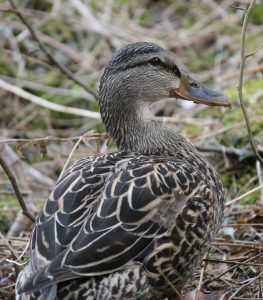
Ducks & Geese
Information
Ducks and geese have learned to thrive in our neighboring communities. In the Spring and Summer months, they might make their nests in public places. It is important to not disturb or relocate their nests. Under the Migratory Bird Convention Act it is illegal to disturb or move any migratory bird or their eggs.
If these birds or their nests are in immediate danger, please contact the Guelph Humane Society at 519-824-3091.
For more information about what to do when you find a baby duck/geese, please see this article from Toronto Wildlife Centre
What to do if you found an orphaned duckling or gosling
Ducks and geese do not leave their young until they are able to be completely independent- this could be up to a year. Therefore, ducklings and goslings should be with their parents at all times. If you see a duckling or gosling without a parent, please call the Guelph Humane Society at 519-824-3091 as they are likely orphaned.
For more information on orphaned birds please visit OSPCA
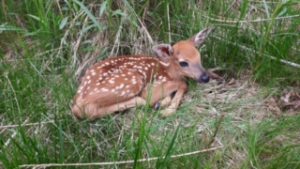
Deer
Information
Deer have adapted well to semi-urban environments and can often be seen within the city boundaries. Deer generally start giving birth in late May and June. It’s normal for mother deer to leave their fawns and only visit a few times throughout the day. This is because the fawn doesn’t have its own scent so by staying away the mother deer is preventing predators from finding the fawn by smelling her. Fawns will lay perfectly still even when approached. If disturbed they may start to cry and even try and follow you. The mother is likely nearby, responding to her fawn’s cry, but she won’t approach when you’re there!
What to do if you find a fawn?
Leave the fawn alone and keep your distance to allow the mother to return. Keep dogs away from the fawn. Simply do not touch the fawn. If you are concerned you can check back in several hours – the mother has most likely come and moved the baby!
If you observe any of the following the fawn is in distress and needs help: crumpled or wrinkled looking ears; flies, ticks or maggots on its body; any signs of blood or wounds. If you observe any of these signs or have any concerns about a fawn please call the Guelph Humane Society at 519-824-3091.
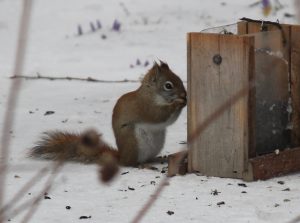
Squirrels
Information
Grey Squirrels are a species that have thrived in cities and neighborhoods as we have provided them with lots of food and nesting sites! Baby squirrels are curious and active and it’s not uncommon for them to get into trouble and fall out of their nests. If you find a baby squirrel alone on the ground, please call the Guelph Humane Society as it may be orphaned, where we can assess and provide further direction.
Identifying Sick or Injured Squirrels
If you see a squirrel exhibiting any of these signs or symptoms, please call the Guelph Humane Society as it may be ill:
- Staggering or weaving around
- Missing large portions of its hair with red, scabby skin
- Running in circles
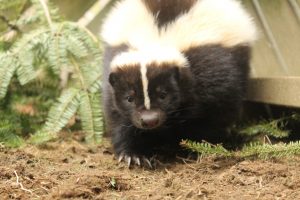
Skunks
Information
An encounter with a skunk can be an unpleasant one if you don’t heed their warnings! It is normal to see skunks out, especially around dusk and dawn. If you give them their space skunks are happy to leave you alone!
For more information about living with Skunks please visit:
How to Avoid a Skunk Spray
Skunks can give off warning signs before spraying
- Stomping their front legs
- Hissing and mock charging
- Raising their tail
- Aiming their hind end towards you
You can look for these warning signs to avoid that lasting smell!
De-skunking Your Dog
Source: HSUS – https://www.humanesociety.org/resources/de-skunking-your-dog
Over-the-counter products (such as Nature’s Miracle Skunk Odor Remover) are a quick fix, but if you don’t have that on hand, you can prep the solution below.
Step 1: Keep your dog outside where possible
You’ll probably want to keep your dog outside while you get it together so they don’t carry the smell indoors. Check their eyes; if they’re irritated or red, immediately flush them with cool water.
Step 2: Mix the Ingredients
Mix together:
- 1 quart of 3-percent hydrogen peroxide (available at any pharmacy)
- 1/4 cup baking soda
- 1 teaspoon liquid dishwashing soap
Wearing rubber gloves, wash your dog with this solution immediately after they’ve been sprayed. DO NOT get the solution in their eyes. (If you don’t have peroxide, baking soda, and liquid soap on hand, use vinegar diluted with water.)
Caution: Do NOT store this mixture or make it ahead of time, as the mixture could explode if left in a bottle.
Step 3: Clean and rinse
Rub the mixture through their fur, but don’t leave it on too long (peroxide can bleach fur). Rinse them thoroughly.
Step 4: Shampoo
Next, wash your dog with pet shampoo and rinse thoroughly. By now, they should be de-skunked and smelling sweet. Thoroughly towel-dry your dog, and be sure to place them in a warm, sunny room for the next couple of hours so that they don’t get chilled.
Owner cleanup
If your dog rubbed some of the stink onto you, you can rid your clothes of the smell by using regular laundry detergent mixed with a half-cup of baking soda.
Identifying Sick of Injured Skunks
Skunks may also exhibit abnormal behaviors similar to raccoons
- Pacing or circling
- Stumbling, weaving or staggering
- No fear of humans/pets
- Sleeping in high traffic areas or in the open during the day
- If you encounter a skunk exhibiting any of these behaviors, please call the Guelph Humane Society at 519-824-3091
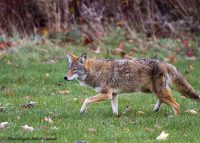
Coyotes
Information
Coyotes are well adapted to life around humans. It is not uncommon to see them during the morning or evenings. They are curious but generally steer clear of people and dogs, however the Guelph Humane Society and the City of Guelph are reminding pet owners to keep their pets supervised and on leash to avoid a coyote conflict.
If you spot a sick or injured coyote please call the Guelph Humane Society.
If you spot a coyote that poses a risk to public safety please call the Guelph Police Services at (519) 824-1212
Read more about coyotes in Guelph .
Report a coyote sighting in the City of Guelph
To learn more about Coyotes in our communities visit Coyote Watch Canada
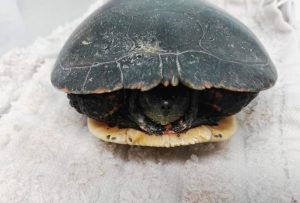
Wildlife Rehabilitation Centers
Information
The Guelph Humane Society works closely with local rehabilitation centers to help wildlife in our communities! Rehabilitation Centers are required to be licensed through the Ministry of Natural Resources or Canadian Wildlife Service. Individuals or organizations must be licensed as a Wildlife Custodian to have the authority to care for wildlife. Here, the wildlife will receive temporary care with the hopes of rehabilitating the animal back into the wild.
If you find a sick, injured or orphaned wildlife animal you can find an appropriate rehabilitator through Ontario Wildlife Rehabilitation Search or contact the Guelph Humane Society at 519-824-3091.
Rehabilitation Centers
Some common rehabilitation centers in our area include:
Toronto Wildlife Center
Toronto, ON
Animals: Bats, Coyotes, Foxes, Groundhogs, Opossums, Rabbits, Raccoons, Reptiles, Skunks, Songbirds, Squirrels, Turtles, Waterbirds
Hobbitstee Wildlife Refuge
Nanticoke, ON
Animals: Rabies vector species, Herptiles, Small Mammals, Small Carnivores, Hoofed Animals, Semi-Aquatic Mammals, Birds.
Wildlife Haven
Waterloo, ON
Animals: Birds, Groundhogs, Porcupines, Opossums, Songbirds, Squirrels, Turtles, Waterbirds, Weasels
Ontario Turtle Conservation Centre
Peterborough, ON
Animals: Turtles
Procyon Wildlife
Beeton, ON
Animals: Coyotes, Deer, Foxes, Groundhogs, Porcupines, Opossums, Rabbits, Raccoons, Reptiles, Skunks, Squirrels, Weasels
For more information about living with wildlife please visit the following:

